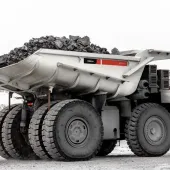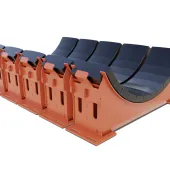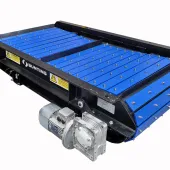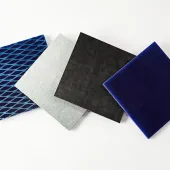Wear-resistant linings for coal preparation plant
Coal can be cleaned through four basic processes: comminution (crushing), sizing, concentration and dewatering. The comminution and sizing involve reducing the size of the coal, usually in a crusher, and then sorting the coal into different product characteristics according to the size of the raw material.
Concentration, which refers to the separation of coal products by physical differences and the specific gravity, is an integral part of the cleaning process. During this phase coal is cleaned and the refuse is separated from the coal. This is normally achieved through the use of equipment such as washing drums, dense-media cyclones, water-only cyclones or flotation cells.
While mineral constituents in coal are quite abrasive, handling the raw material through the cleaning process alone can cause problems. The general characteristics of the bulk material can detrimentally affect the plant and processes through which the material is transferred, such as pipes, conveyors, crushers, silos, screens, feeders, cyclones and washing drums. In online preparation plants, equipment failures can bring serious problems and substantially increase costs. Designed to implement best engineering practise, Kingfisher Industrial say that their wear-resistant lining systems can help key plants and equipment to operate on a continual basis, which in turn can lead to increased efficiencies and profitability.
Case study: wear protection in dense-media cyclones
One project, carried out for a coal preparation plant, looked at the wear issues experienced during the concentration phase of the raw material. The coal-washing process was being outsourced by the mine to a contractor, who was under pressure to meet demanding standards of performance and product quality to fulfil its contract with the mining plant.
The main activities involved washing small coal from 25mm down to about 3.5mm to remove dirt and dust in four washing lines with a combined throughout capacity of 800 tonnes/h. According to the process manager: '[The] client expects us to be capable of handling any throughput up to the contractual maximum and to maintain tightly defined standards in respect of water and ash content. We can only do this if our plant is constantly maintained at peak efficiency, and so we make substantial investments in regular inspection and refurbishments of the plant, which is known to be exposed to constant wear issues.'
The existing cast iron dense-media cyclones were rapidly deteriorating. The wear issues were becoming more prominent due to the handling of the abrasive material and the costs of repair were too high. The plant then looked for new equipment that could provide a longer service life. The following were the key specifications for the new equipment: constant flow promotion; ease of maintenance; high resistance to the abrasive characteristics of the raw material; and compatibility with the existing installation.
Having looked at a number of cyclone suppliers, the company was unable to find the right mix of attributes required. It decided instead to opt for a custom-made solution and invited tenders of four units from a number of manufacturers.
The plant manager explained: 'We are an ISO 9000 site and have to work to high standards. Safety is our prime consideration, followed closely by high performance and fully documented procedures. When Kingfisher was selected to build the new cyclones, the plant process manager and engineers were aware of their experience in the coal industry and the requirements for the project. The proposal from Kingfisher Industrial proved to be very cost effective and provided a guaranteed extended expectancy of the cyclone and the lining.'
The cyclones were designed and manufactured to fit into the existing plant without any modifications. A mild steel structure was clad internally with K-ALOX high-alumina tiles varying from 6-25mm thick according to the projected exposure of the surface to abrasion.
According to John Connolly, managing director of Kingfisher Industrial: 'The tiles are bonded to the steel shell by a high-strength epoxy, which is specially formulated to withstand this type of application. A modular approach to construction is designed to allow easy replacement of high wear components. The new cyclones are guaranteed in this environment for three years – a significant advance over the nine month life of the original cast units. Furthermore, the cyclones can be repaired and relined to extend their life when this becomes necessary; again offering an advantage over nonreusable cast versions.'
'The new cyclones are a big improvement over the originals,' commented the washing plant’s process manager. 'Their performance is excellent, and because the interior is lined, very little wear occurs. The result is that the bore remains at the correct size and operating efficiency is maintained consistently over a long period. There were no tolling or foundry costs, so the purchase price was actually lower than the original units, and the manufacturer's ability to fabricate complex shapes quickly meant that delivery times were very short. We now have four very high-performance cyclones that make a positive contribution to our success in running the current contract.'
Kingfisher Industrial provide wear-resistant lining systems for the coal preparation industry, including cyclone feed pipe work, inlet and outlet piping for pumps, coal transverse chutes and lauders, feed tanks, dewatering screens and lined filter press rollers.









